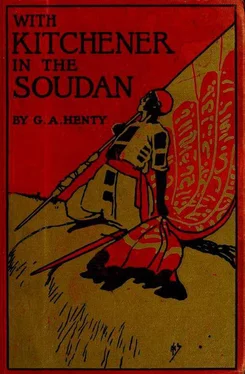" I could tell you that; so could any of the officers. Their dress differs very little from the ordinary Arab costume. Nearly all wear loose white trousers coming down to the ankles. In some cases these are the usual baggy Eastern articles, in others the legs are separate. They almost all wear the white garment coming down to the knee, with of course a sash round the waist, and sleeves reaching down to the elbow or an inch or two below it. Some wear turbans, but the majority simply skull-caps. I could get the dress made up in three or four hours. But the risk is altogether too great, and I do not think that I should be justified in allowing you to undertake it."
" I really do not think that there will be any great danger, sir. If there were no great object to be gained it would be different; but in view of the great importance, as you said this evening, of learning Mahmud's intentions, the risk of one life being lost, even were it great, is nothing. As you say, the Sirdar's plans might be greatly affected by the course Mahmud adopts, and in such a case the life of a subaltern like myself is a matter scarcely to be considered. From childhood I have been preparing to go among the Dervishes, and this is what I propose doing as soon as Khartoum is recaptured. Therefore, sir, if by anticipating my work by a few months, or possibly a year, I can render a service to the army, I would gladly undertake it if you will give me permission to do so."
The General was for a minute or two silent. "Well, Hilliard," he said at last, " on thinking it over as you put it, I do not know that I should be justified in refusing your offer; it is a very gallant one, and may possibly meet with success."
" Thank you, sir! I shall be really glad to enter upon the work I have looked forward to. Although it may have no direct bearing upon the discovery of my father's fate, it will be a start in that direction. Do you think that I had better go mounted or on foot?"
"I should say certainly on horseback, but there is no occasion for any hasty determination; every step should be carefully considered, and we should, as far as possible, foresee and provide for every emergency that may arise. Think it over well yourself. Some time to-morrow I will discuss it again with you."
Gregory went straight back to his hut.
" Come in, Zaki, I want to speak to you. Light the lamp and shut the door. Now sit down there. Do you know the country between this and Metemmeh?"
"Yes, master; I travelled there with my father six years ago."
"Is it difficult to find the way?"
" It is not difficult. There are many signs of the passage of caravans. There are skeletons of the camels of the English expedition; there are very many of them. It would not be difficult, even for one who has never passed them, to find the way."
"And there are wells?"
"There are wells at Howeyat and Abu Haifa, at Gakdul and Abu Klea, also at Gubat."
"That is to say, water will be found nearly every day?"
"Quite every day, to one on horseback. The longest distance is from Gakdul to Abu Klea, but that would not be too long for mounted men, and could even be done by a native on foot in a long day's march."
" Do you know whether Mahmud's army is in Metemmeh or outside the town?"
"From what I have heard, most of the Dervish force is on the hills behind the town. They say Metemmeh is full of dead, and that even the Dervishes do not care to live there."
"The Baggara are mostly mounted, are they not?"
" Most of them are so, though there are some on foot. The leaders of the tribesmen who fight for the Khalifa are all on horseback, but most of the army are on foot."
"You do not speak the Baggara language, I suppose?"
Zaki shook his head. "I know a little Arabic, but not much."
" I suppose most of the Arab tribes in the Soudan speak a dialect very much like the Baggara?"
"Yes; it is everywhere Arabic, and there is but little difference; they can all understand each other and talk together. May your servant ask why you put these questions?"
" Yes, Zaki, but you must not mention what I tell you to a soul."
"Zaki will be as silent as the grave."
" Well, I am going up dressed as a Mahdist. I can speak the Baggara tongue well. I am going to try and find out what they are going to do: whether they will march to Berber, or come here, or remain at Metemmeh."
Zaki stared at his master in speechless amazement. Gregory could not help smiling at the expression of his face.
"There does not seem much difficulty in it," he said. "I can speak with you in the dialect of Dongola, but the Baggara language is much easier to me, because I have been accustomed to speak Arabic since I was a child. Of course my skin will be dyed and I shall wear the Dervish dress. There is no difficulty in this matter."
"But they would cut you in pieces, my lord, if they found out that you were a white."
"No doubt they would, but there is no reason why they should find that out. It would be much more dangerous for you to go into their camp than it would be for me. In the first place, you can scarcely speak any Arabic; and in the second, they would see by your features that you are one of the Jaalin. Whereas my features, when stained, would be much more like those of the Arabs than yours would.
"Where should I be most likely to meet the Dervishes first?"
" I do not think any of them are much this side of Metemmeh at present. Sometimes parties ride down to Gakdul, and they have even passed on till they are within sight of this camp; but when they have found out that the wells are still unoccupied and the army here quiet, they go back again."
" If I go on horseback, Zaki, I shall want someone with me who will act as a guide, and who will look after his horse and mine at some place near the river, where he can find a hiding-place while I am away in the Dervish camp."
"Would you take me, my lord?" Zaki said quickly.
"I would much rather take you than anyone else if you are willing to go, Zaki."
"Surely I will go with my lord," the native said. "No one has ever been so good to me as he has. If my lord is killed I am ready to die with him. He may count on me to do anything that he requires, even to go with him into the Dervish camp. I might go as a slave, my lord."
"That would not do, Zaki. I do not wish to travel as a person who could ride attended by a slave. People might say, who is this man I where does he come from ? how is it that no one knows a man who rides with a slave? My great object will be to enter the camp quietly as one who has but left half an hour before. When I have once entered it, and they ask whence I came, I must tell them some likely story that I have made up: as, for example, that I have come from El Obeid, and that I am an officer of the governor there; that, finding he could not get away himself, he yielded to my request that I might come and help to drive the infidels into the sea."
Zaki nodded. "That would be a good tale, my lord, for men who have escaped from El Obeid and have come here have said that the Khalifa's troops there have not been called to join him at Omdurman, for it is necessary to keep a strong force there, as many of the tribes of the province would rise in rebellion if they had the chance; therefore you would not be likely to meet anyone from El Obeid in Mahmud's camp."
" How is it, Zaki, that when so many in the Soudan have suffered at the hands of the Dervishes, they not only remain quiet, but supply the largest part of the Khalifa's army?"
"Because, my lord, none of them can trust the others. It is madness for one tribe to rise as the Jaalin did at Metemmeh; the Dervishes wiped them out from the face of the earth. Many follow him because they see that Allah has always given victory to the Mahdists; therefore the Mahdi must be his prophet. Others join his army because their villages have been destroyed and their fields wasted, and they see no other way of saving themselves from starvation. There are many who fight because they are fond of fighting. You see how gladly they take service with you and fight against their own countrymen, although you are Christians. Suppose you were to conquer the Khalifa to-morrow, half his army would enlist in your service if you would take them. A man who would be contented to till his fields, if he could do so in peace and quiet, fears that he may see his produce eaten by others and his house set on flames, and would rather leave his home and fight—he cares not against whom. The Mahdist army are badly fed and badly paid; they can scarce keep life together. But in the Egyptian army the men are well taken care of; they have their rations and their pay. They say that if they are wounded, or lose a limb and are no more able to fight, they receive a pension. Is it wonderful that they should come to you and be faithful?"
Читать дальше












